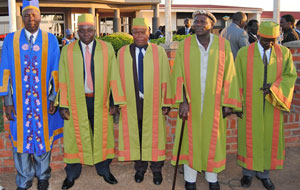Hearing of the labour dispute between Malawi’s Clerk of Parliament Matilda Katopola and her employers starts on September 4 with pre-trial, a rare procedure government says is reserved for complicated cases.
This is the case in which Katopola wants the Industrial Relations Court in Lilongwe to declare that the Parliamentary Service Commission (PSC) constructively dismissed her and should compensate her accordingly.
During pre-trial hearing, both sides will separate issues of agreement and disagreements and reach a consensus on the case’s procedures, according to acting chief state advocate Dr. Zolomphi Nkowani.
“It is a conference where both sides put issues together and narrow them down. It is a process where the AG [Attorney General], representing the PSC, and Katopola, through her lawyer, will sit around the table. They will work out a procedure to follow. This is the third stage of the case. The fourth stage will be a full trial,” said Nkowani in an interview on Thursday.
The first stage was when Katopola filed the case and the second involved the AG entering defence, he said.
In a separate interview, Solicitor General Anthony Kamanga said pre-trials are not common in Malawi and they generally involve complicated cases.
What pre-trial is
According to Black’s Law Dictionary (6th edition), pre-trial hearing is a procedural device used prior to trial to narrow issues to be tried, to secure stipulations as to matters and evidence to be heard, and to take all other steps necessary to aid in the disposition of the case.
The definition further says such conferences between opposing attorneys may be called at the discretion of the court.
The actions taken at the conference are made the subject of an order which controls the future course of the action.
Katopola’s lawyer Yambani Mulemba was not available for comment, but the Clerk of Parliament confirmed the pre-trial hearing in an interview on Thursday.
On July 26 2012, Katopola filed a case at the IRC, asking the court to declare her as having been constructively dismissed and that the conduct of the PSC amounted to unfair labour practices.
She is also seeking compensation for unfair dismissal, unfair labour practices, and severance pay and terminal benefits, according to court records.
Our calculations show that Katopola could get up to K900 million (about $3.6 million) in compensation comprising salaries, benefits and retirement package calculated up to 2030 when she will have retired.
This figure, however, does not appear on her statement of claim; neither is there any other sum.
But the PSC, through the AG, entered defence mid August this year in which it rejected Katopola’s claim of constructive dismissal, unfair dismissal and unfair labour practices or any breaches of labour laws or the Constitution.
The PSC also counterclaimed that the applicant has absconded her duties for no good reason by failing to report for work as advised by the respondent (PSC) after it lifted her suspension.
In May this year, without giving reasons, the PSC recommended to President Joyce Banda that Katopola be removed from office. It also sent her on compulsory leave pending the President’s decision.
But in mid July, Banda refused to sack Katopola, saying the PSC did not follow procedures in recommending her removal.
Following the President’s move, the PSC wrote Katopola asking her to resume work but she refused, arguing the PSC had to clarify some things.
These included the commission’s motive behind its decision to send her on compulsory leave without reason or explanation and its position on the criminal case in which she is answering charges connected to abuse of office and failure to declare interest in award of contracts after she allegedly gave an K87 000 deal in 2007 to Monik Trends, a firm in which she is said to have an interest.




